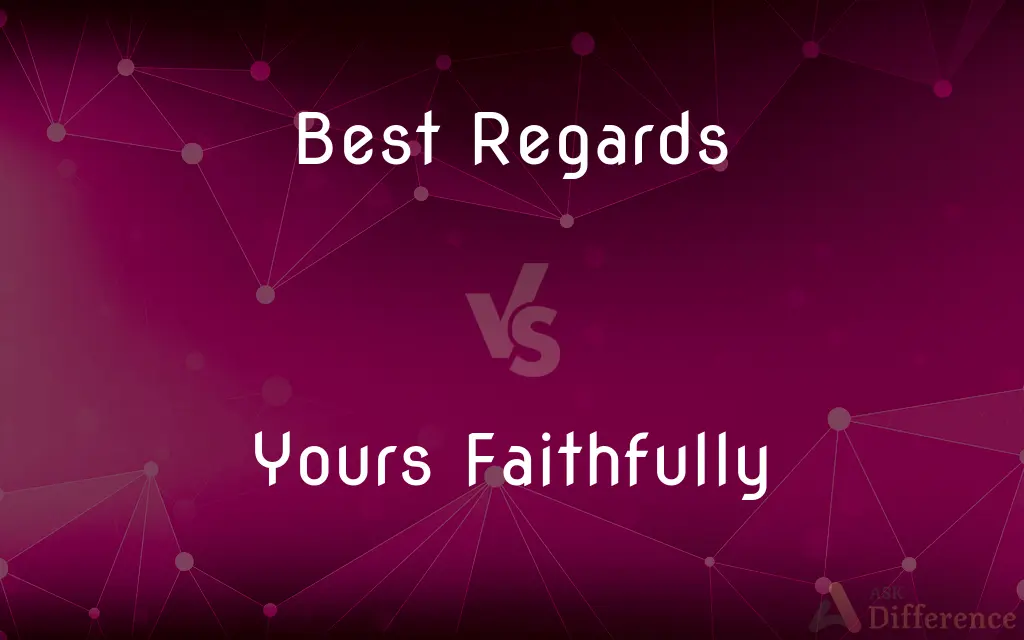Best Regards vs. Yours Faithfully — What's the Difference?
Edited by Tayyaba Rehman — By Fiza Rafique — Published on November 23, 2023
"Best Regards" is a common sign-off in informal and semi-formal emails or letters. "Yours Faithfully" is a formal closing used in British English when the recipient's name is unknown.

Difference Between Best Regards and Yours Faithfully
Table of Contents
ADVERTISEMENT
Key Differences
"Best Regards" is often used in contemporary communication, especially in emails, to convey warm wishes without being overly formal. In contrast, "Yours Faithfully" is traditionally British and is typically used in formal letters when the recipient's name isn't known.
"Best Regards" straddles the line between formality and informality, making it suitable for a wide range of correspondences. "Yours Faithfully," however, leans heavily towards formality and might sound outdated or overly formal in casual contexts.
In American English, "Best Regards" is more commonly used than "Yours Faithfully." However, in British English, especially in traditional contexts, "Yours Faithfully" has a recognized place, especially in formal business correspondence.
"Best Regards" is adaptive; it can be tweaked to fit the tone of the letter or the relationship with the recipient (e.g., "Warm Regards," "Kind Regards"). "Yours Faithfully" remains unchanged in its usage and conveys a sense of unwavering respect and formality.
In the digital age, with the prevalence of global communication, "Best Regards" is often favored for its universal applicability and understood tone. "Yours Faithfully" might be less understood or may come off as overly formal to those unfamiliar with British formalities.
ADVERTISEMENT
Comparison Chart
Level of Formality
Semi-formal to informal.
Highly formal.
Usage Region
Common in American and global communication.
Traditionally British.
Context of Use
Emails, informal letters.
Formal letters when recipient's name is unknown.
Flexibility in Phrase
Can be adapted (e.g., "Warm Regards").
Remains unchanged in its formality.
Perception in Modern Times
Seen as contemporary and universally apt.
Might be perceived as outdated or overly formal by some.
Compare with Definitions
Best Regards
A valediction expressing goodwill.
Thank you for considering my proposal. Best Regards, Jane.
Yours Faithfully
A sign-off conveying respect and formality.
Please find attached the requested documents. Yours Faithfully, Paul.
Best Regards
An adaptable sign-off based on the relationship with the recipient.
Take care and stay safe. Best Regards, Sam.
Yours Faithfully
A standard closing in British business correspondence when addressing unknown recipients.
To whom it may concern, [Letter Content]. Yours Faithfully, Steve.
Best Regards
A closing remark suitable for both formal and informal communications.
Hope to hear from you soon. Best Regards, Mike.
Yours Faithfully
An ending note that signifies tradition and etiquette.
I trust this meets with your approval. Yours Faithfully, Mark.
Best Regards
A commonly used sign-off in emails conveying warm wishes.
I look forward to your feedback. Best Regards, John.
Yours Faithfully
A traditional British closing for formal letters when the recipient's name is unknown.
I am writing to apply for the advertised position. Yours Faithfully, Susan.
Best Regards
A polite way to end a correspondence.
Please let me know if you need any further information. Best Regards, Linda.
Yours Faithfully
A valediction used to convey unwavering respect.
I await your esteemed response. Yours Faithfully, Clara.
Common Curiosities
Is "Best Regards" more American?
It's widely used in American English and has global recognition.
What does "Best Regards" mean?
"Best Regards" is a common sign-off expressing warm wishes, suitable for a range of correspondences.
Is "Yours Faithfully" outdated?
It's traditional, especially in British formal letters, but might be perceived as old-fashioned in casual contexts.
Which one is more formal: "Best Regards" or "Yours Faithfully"?
"Yours Faithfully" is more formal than "Best Regards."
Can "Best Regards" be used in business emails?
Absolutely, it's common in business emails for its balanced tone.
When should I use "Yours Faithfully"?
Use "Yours Faithfully" in formal letters, especially in British English, when the recipient's name is unknown.
Is "Best Regards" casual?
"Best Regards" is semi-formal, making it apt for both informal and some formal communications.
Can I use "Yours Faithfully" in emails?
While possible, it might sound overly formal in most email contexts.
Can I modify "Best Regards" based on context?
Yes, it's adaptable, e.g., "Warm Regards" or "Kind Regards."
Is "Yours Faithfully" used in American English?
It's less common in American English and more traditionally British.
Which closing should I use for a universal audience?
"Best Regards" is often favored for its universal applicability and understood tone.
Are there alternatives to "Yours Faithfully"?
"Yours Truly" and "Yours Sincerely" are other formal alternatives.
Do younger generations use "Yours Faithfully"?
Its use has waned among younger generations, especially outside of the UK.
Should I always use "Yours Faithfully" when the recipient's name is unknown?
Traditionally, yes, especially in British formal letters.
Are there alternatives to "Best Regards"?
Yes, like "Warm Regards," "Kind Regards," and "Best Wishes."
Share Your Discovery

Previous Comparison
Peracetic Acid vs. Hydrogen Peroxide
Next Comparison
Physiological Needs vs. Psychological NeedsAuthor Spotlight
Written by
Fiza RafiqueFiza Rafique is a skilled content writer at AskDifference.com, where she meticulously refines and enhances written pieces. Drawing from her vast editorial expertise, Fiza ensures clarity, accuracy, and precision in every article. Passionate about language, she continually seeks to elevate the quality of content for readers worldwide.
Edited by
Tayyaba RehmanTayyaba Rehman is a distinguished writer, currently serving as a primary contributor to askdifference.com. As a researcher in semantics and etymology, Tayyaba's passion for the complexity of languages and their distinctions has found a perfect home on the platform. Tayyaba delves into the intricacies of language, distinguishing between commonly confused words and phrases, thereby providing clarity for readers worldwide.











































